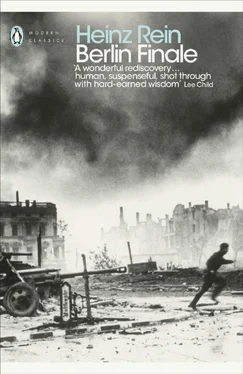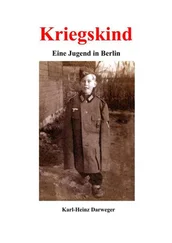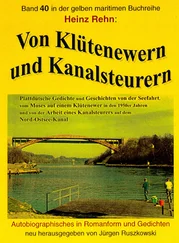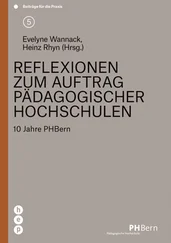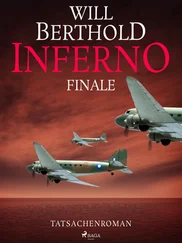Then the car brakes hard, the doors are pulled open, General Weidling, Fritzsche and Dr Kriegk get out, they are standing outside a house on the Schulenburg-Ring, one of the many streets of Tempelhof where there are rows of uniform new buildings. They slowly climb the stairs while an unpleasant, damp, cold wind blows through the empty windows of the stairwell, the sun has disappeared behind grey clouds and a fine rain is beginning to drift down. The general looks fleetingly at the street, then he steps inside a flat on the first floor, is led down a corridor and stands in a room. It is a nice middle-class gentleman’s room with a desk and a bookcase, a leather sofa with a still life above it, a few chairs and a filing shelf, a nice middle-class gentleman’s room, but it isn’t a smooth gentleman sitting behind the desk, it is a medium-sized, powerful, squat man with a wide, reddened face, short, light, bristly hair, watery-blue, determined eyes: General Zhukov, the conqueror of Berlin. He rises to his feet for a moment, points to a chair and sits down again. General Weidling brings his hand correctly to his cap and then takes it off, sits wearily down and furtively looks the other man in the face. This Zhukov, he may be thinking now, is not a general by blood, upbringing and privilege, he is a broad, almost corpulent peasant who wears a general’s uniform, a man from that incomprehensible country. He is now sitting behind a desk in this small, almost petty-bourgeois flat in Berlin-Tempelhof and pushing the capitulation document across the tabletop. The desk is otherwise completely empty, nothing interrupts its smooth, light-brown grain. There is only this white sheet of paper.
General Weidling gulps violently a few times, cleans his glasses again and unscrews his fountain pen. His hands trembling a little, he begins to sign, but then pulls the pen back. It has probably occurred to him that he may know the contents off by heart but he doesn’t know the text, he darts through it quickly and then brings the pen to the paper. It is six o’clock in the morning and very quiet in the room, the shorthand typist by the window has interrupted her work and turned round, the Russian officers bend their heads down, even Fritzsche and Dr Kriegk can’t escape the tension of the moment, only General Zhukov sits there quietly, leaning back in his chair, his eyes resting on the hand of the German general holding the pen. The general seems to sense their gaze, he glances up for a second and then looks at his own hand, which lies in front of him, half clenched into a fist, like a worm-eaten fruit, then he moistens his lips and resolutely writes his name below the document. Berlin has capitulated.
A few words are exchanged, then the general leaves the room. He quickly goes downstairs and doesn’t worry about his companions, he still has a task which he would like to put behind him as quickly as possible, and climbs back into the armoured reconnaissance vehicle.
This time the door is not quite closed, the general can look through the open crack at the streets they are driving along, and he sees the endless columns of marching Red Army men, troops of tanks, batteries of artillery, bivouacs and the long rows of the defeated trudging dully into imprisonment. He also looks at the steaming field kitchens, besieged by the population, and the trucks to which hands are no longer outstretched in the Hitler salute, but reaching for bread distributed by the soldiers of the victorious army.
This time they are going to Johannisthal. In a former film studio, the general stands by a recording machine, and here he dictates his last order into a wax cylinder machine:
‘Berlin, 2 May 1945
On 30 April 1945 the Führer abandoned those who had sworn loyalty to him. On the Führer’s orders you still believe you must continue to fight for Berlin, even though the lack of heavy weapons and ammunition and the overall situation makes fighting appear pointless.
Every hour that you continue to fight prolongs the terrible suffering of the civilian population of Berlin and our wounded. In agreement with high command of the Soviet troops I therefore request that you cease fighting.
Weidling General of the Artillery and Commander Defence Zone Berlin.’
Dr Böttcher, Wiegand and Schröter slowly climb a wide flight of steps, the central staircase of a primary school which has suffered no damage apart from broken windowpanes. It is a cool, rainy day, the wind blows through the open windows, every now and again a piece of glass falls to the floor or a window frame rattles. On the clothes hooks where once children’s coats, caps and lunchboxes hung, there now hang steel helmets, sub-machine guns, gas masks, ammunition belts, and the steps that once echoed with the sound of hundreds of children’s feet when the bell rang for the beginning or the end of class, now echo with the hurried steps of solid, hobnailed boots, the corridors and rooms that once were filled with the cheerful chatter of many children’s voices now whir with strange sounds. The primary school has become the base of a Russian military commandant.
The men stop outside a door on the second floor and greet others who wait with serious faces. On the door the sign ‘conference room’ can still just be read, and above it a piece of cardboard with Russian writing is fastened with a drawing pin.
Then everyone enters the room. At a big table sits a Russian major with his back to the window, his hair is greying at the temples, he has several days’ growth of beard, his eyes are red-rimmed, his eyelids lie thick and heavy, the deep wrinkles of exhaustion are etched around his mouth and eyes. On the long side of the table sits a young staff sergeant with a narrow, dark head. He has a few sheets of paper in front of him, and holds a fountain pen.
With a heavy, weary gesture the major points to the chairs that stand around the table. When the men have sat down, he looks attentively and questioningly around at the faces. A few seconds pass like that, a few guns echo in the distance, hurrying footsteps in the corridor thunder back and forth, but here in the military commandant’s room it is quiet.
‘Gentlemen!’ the major begins at last. ‘You have been described to me as reliable and trustworthy, and I should like to ask you whether you are willing to assume the temporary administration of this district.’
The major speaks excellent German, with a slight accent, a rolling ‘r’, strictly separating the syllables in a staccato fashion.
‘The task before you is an incredibly difficult one,’ the major continues, ‘it cannot be accomplished with bureaucratic methods. You must supply the population with food, water and electricity as soon as possible, and I promise to help you do so, as far as it is in my power.’
‘I am sure of it, Major,’ Schröter shouts.
Dr Böttcher and Wiegand say nothing.
The major looks at the sergeant, whose pen is gliding rapidly over the paper.
‘As the mayor’s office you can occupy some rooms in this school for the time being. I will issue the order that they be freed up for you. Sergeant Yenakiev will give you papers which will allow you to pass unhindered, and you will also be given armbands to identify you to the outside world.’
Again the major lets his eye wander over the men’s faces.
‘I expect you to use all your strength and all your knowledge to overcome the misery of your people. Go to work without hesitation. I expect your first report by this time tomorrow. Thank you, gentlemen.’
When Dr Böttcher, Wiegand and Schröter go back downstairs, they stop by an open window. From here their eyes wander far over the sea of houses, over fields of rubble and fires, over torn streets and churned-up squares. The big city lies before them, mown down by the scythe of death, extinguished by the flaming torch of war, stamped down by the feet of the armies. A hurricane of destruction has torn down everything in its path, but there is still a breath within it, the blood in its veins has not yet frozen, the will of its people is not completely broken. Heavy clouds of smoke rise into the gloomy sky, jagged ruins obscure the horizon, here and there a church tower rises up like an extinguished torch, everywhere the roofs show their bare beams, cracks and breaches gape in the walls, panes of glass are missing from the windows. Down below in the street, mountains of debris have piled up, street lights and tram masts have collapsed, the cobbles have been blasted, the tracks torn up, the overhead lines dangle, the shops are merely empty, looted caves, desperate, hungry, weary, homeless people wander around, soldiers stagger dull-faced and dead-eyed to the assembly centres, while the cries of the women being raped echo from the houses.
Читать дальше
